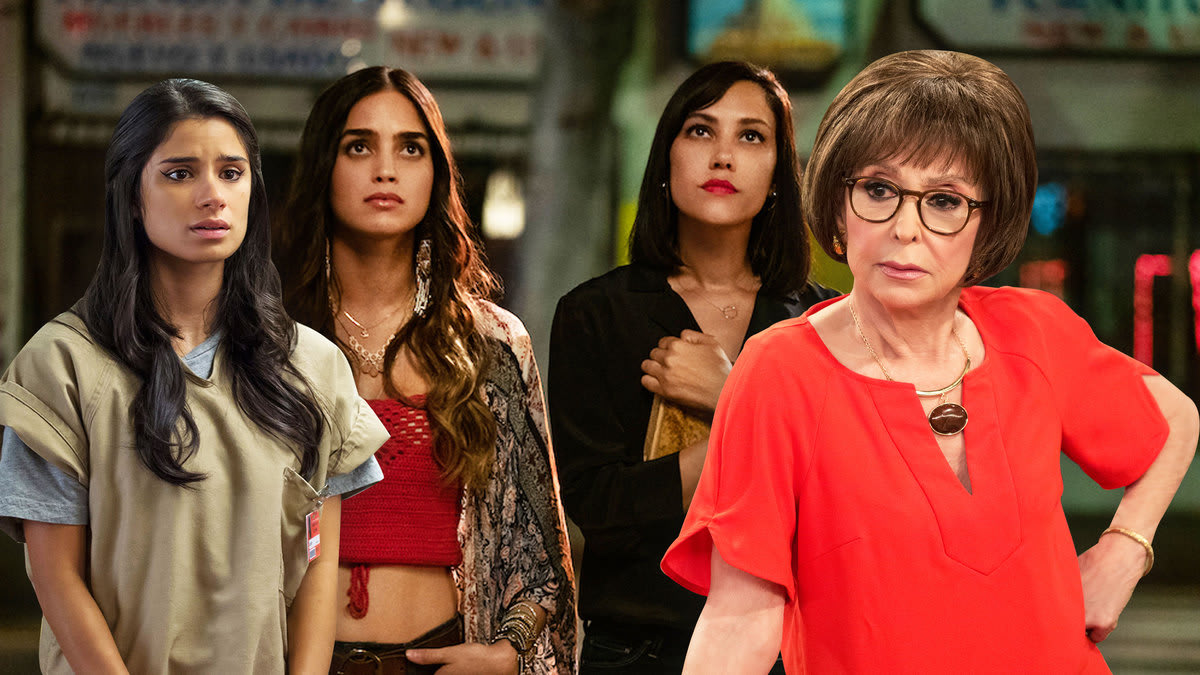What the Hell Do Latinx Actors and Shows Have to Do to Get an Emmy Nomination?

Photo Illustration by The Daily Beast
The continued disrespect of Rita Moreno will not stand!
Dear Television Academy: I just want to talk! I’ll let my colleague Kevin Fallon handle the snubs and surprises from Tuesday morning’s nominations, but I do have to ask: How do you rationalize, year after year, snubbing actual living legend Rita Moreno?
Tuesday’s Emmy nominations included only one Latinx actor, Outstanding Guest in a Drama Series nominee Alexis Bledel. But not Rita Moreno, who has been killing it on One Day at a Time for four seasons. Not Laura Gómez, whose performance in Orange Is the New Black’s excellent final season was alternatively haunting and inspiring—and as timely as it gets. Not Melissa Barrera or Mishel Prada of Vida, a series that pushed past stereotypical Latinx stories to discuss deeper, more nuanced issues that pervade our community before it was canceled too soon. Not any of the brilliant performers on HBO’s sublimely weird Los Espookys—including Julio Torres, Ana Fabrega, Bernardo Velasco, and Cassandra Ciangherotti. Not Joaquín Cosío, the beating heart of Netflix’s beautifully complex and raucously funny Gentefied. Not Mj Rodriguez, who alongside lead actor nominee Billy Porter has brought tenacity and boundless spirit to FX’s Pose. And not Harvey Guillén, who plays the lovable wannabe vampire Guillermo in What We Do in the Shadows.
These disappointments would be laughable if they weren’t so demoralizing. Last year, although four Latinos received nominations and one, Jharrel Jerome, took home a well-deserved trophy for the essential Netflix miniseries When They See Us, not a single Latina performer got a nod from the Television Academy. And this year, once again, despite a wealth of talent, too few Latinx names made it to the ballot. (Although at least the Academy threw us one more bone by nominating Shakira and Jennifer Lopez’s history-making Super Bowl halftime show for Variety Special.)
One could make all sorts of arguments for why these series and stars have been overlooked. Maybe One Day at a Time’s multi-cam format has precluded it from being taken seriously enough for recognition. Perhaps Orange Is the New Black simply got forgotten because of how long ago it debuted. Could Vida’s relatively low viewership have cost it a shot at major awards?
To that I say: The Big Bang Theory sure didn’t lack for Emmy nominations, despite its multi-cam format. Big Little Lies, which debuted its second season weeks before Orange Is the New Black Season 7, still managed to get two actresses—Laura Dern and Meryl Streep—supporting nods. And as for the viewership factor: How many people actually watch The Kominsky Method?!
The lack of Latinx nominees in major categories might be less frustrating if diversity in Hollywood had not been a central topic of conversation for so many years already. The entertainment industry loves to pay lip service to taking these issues seriously—but rarely seizes the easiest and most obvious opportunities to improve upon the past. For instance: Remember the time the 2018 Oscars made a big show of celebrating Latinx talent without actually putting any Latinx nominees on the stage?
Rita Moreno’s constant omission from the Emmy nominees list remains the most consistently confusing. But the most disheartening snubs this year might belong to Orange Is the New Black’s Latina stars. For seven seasons, the series has highlighted the injustices endemic to our prison system—and although it admittedly went off the rails for a few seasons, its seventh and final installment was a vital return to form.
Orange Is the New Black’s final season debuted last summer, and included a plot that was painfully timely: At a time when deportation and family separation were a central topic of conversation, OITNB tackled ICE.
The season’s most timely storyline belongs to Laura Gómez, who plays Blanca Flores, and Diane Guerrero, who returns as a special guest star to play Maritza Ramos. The two characters find themselves detained by ICE.
Maritza is initially optimistic because she believes that she’s a legal citizen—but she later finds out that this is not the case, and halfway through the season she’s deported to Colombia in a scene that is as haunting as it is heartbreaking. The story, and Guerrero’s performance, were made even more impactful by Guerrero’s personal history with deportation: When she was 14, she returned from school in Boston to an empty house, only to discover later that her parents had been deported to Colombia.
Blanca, on the other hand, is a legal resident who was cheated out of her green card. When Maritza first finds her at the same detention facility, Blanca is morose and resigned to her fate. But inspired by Maritza, and with the help of a fellow detainee, Blanca regains her fighting spirit and eventually wins her court case. And rather than live in the U.S. alone, she chooses to reunite with the love of her life, Diablo, who has been deported to Honduras.
Laverne Cox took home the show’s only Emmy nod this year. And to be clear, Laverne Cox deserves every award nomination she’s received and then some. But it’s nonetheless frustrating that some of her Latinx co-stars could not have shared the glory alongside her, whether it be Guerrero as a guest star or Gómez as a supporting actress. (Or Elizabeth Rodriguez, who played the fiercely complex Aleida Diaz, or Dascha Polanco, who plays her once innocent daughter Daya, or Selenis Leyva whose Gloria Mendoza is one of the show’s most compelling protagonists. The list goes on!)
Each year, one can attribute the Emmys’ relatively small to nonexistent list of Latinx nominees to various circumstances. Anti-CW bias here, a show that’s lost the attention of the Academy there... But the one thing that seems to remain consistent is the scarcity of nominees itself. And thanks to a few recent cancellations, there are now no Latinx series left on network television. Qué barbaridad.
Correction: An earlier version of this article omitted Emmy nominee Alexis Bledel, who is of Argentinian and Mexican descent.
